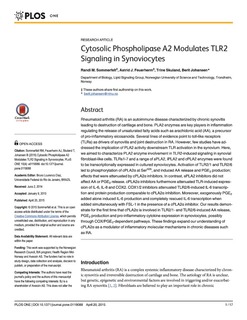Cytosolic phospholipase A2 modulates TLR2 signaling in synoviocytes
Journal article, Peer reviewed
Permanent lenke
http://hdl.handle.net/11250/284761Utgivelsesdato
2015Metadata
Vis full innførselSamlinger
- Institutt for biologi [2575]
- Publikasjoner fra CRIStin - NTNU [38127]
Sammendrag
Rheumatoid arthritis (RA) is an autoimmune disease characterized by chronic synovitis leading to destruction of cartilage and bone. PLA2 enzymes are key players in inflammation regulating the release of unsaturated fatty acids such as arachidonic acid (AA), a precursor of pro-inflammatory eicosanoids. Several lines of evidence point to toll-like receptors (TLRs) as drivers of synovitis and joint destruction in RA. However, few studies have addressed the implication of PLA2 activity downstream TLR activation in the synovium. Here, we aimed to characterize PLA2 enzyme involvement in TLR2-induced signaling in synovial fibroblast-like cells. TLRs1-7 and a range of sPLA2, iPLA2 and cPLA2 enzymes were found to be transcriptionally expressed in cultured synoviocytes. Activation of TLR2/1 and TLR2/6 led to phosphorylation of cPLA2α at Ser505, and induced AA release and PGE2 production; effects that were attenuated by cPLA2α inhibitors. In contrast, sPLA2 inhibitors did not affect AA or PGE2 release. cPLA2α inhibitors furthermore attenuated TLR-induced expression of IL-6, IL-8 and COX2. COX1/2 inhibitors attenuated TLR2/6-induced IL-6 transcription and protein production comparable to cPLA2α inhibition. Moreover, exogenously PGE2 added alone induced IL-6 production and completely rescued IL-6 transcription when added simultaneously with FSL-1 in the presence of a cPLA2α inhibitor. Our results demonstrate for the first time that cPLA2α is involved in TLR2/1- and TLR2/6-induced AA release, PGE2 production and pro-inflammatory cytokine expression in synoviocytes, possibly through COX/PGE2-dependent pathways. These findings expand our understanding of cPLA2α as a modulator of inflammatory molecular mechanisms in chronic diseases such as RA.
